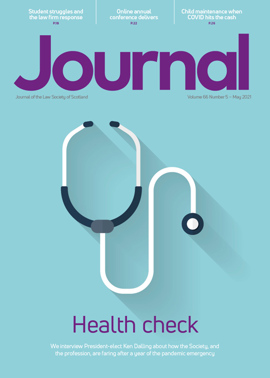Employment: Updates from the bench
“The pandemic has acted as both a disruptor and an accelerant” (A Road Map for 2021-2022, Employment Tribunals, 31 March 2021).
When reading this publication, issued as a joint message from the Presidents of the Employment Tribunals for England & Wales and Scotland, I was struck by, and welcome, the forward-thinking approach taken. Amongst other things, the message acknowledges the unexpected efficiencies of the new ways of working we have all had to get used to; comments that we should not turn our back on the innovations some of us have been forced into grappling with; and proposes that technology is the “servant of justice, not its master”.
In terms of practicalities, the tribunals will introduce a new case management system which should be more efficient and reliable than previous systems. We are told that this will assist with remote working in future. In the coming months, we can expect flexible cross-deployment of the tribunals’ judiciary between the two jurisdictions for the first time. Further, it is no longer possible, due to the inflated caseload, to have final hearings exclusively face to face. The Presidents state that video technology will remain an essential feature of employment hearings while the caseload challenge persists. We are to expect this to continue for at least two years.
As readers might expect, this is not to the satisfaction of all users of the tribunals (“divergent views” are also held by employment judges and lay members). As the senior managers of many employers are concluding (more below), the leadership of the tribunals has determined that the better approach to hearings is to recognise that a mixture of platforms (remote, hybrid and in-person) is likely to be the best one.
Calculating pension loss
The second publication from the Employment Tribunals in recent weeks (15 March) is the third revision of the fourth edition of the tribunals’ Principles for Compensating Pension Loss. With the full version coming in at a whopping 186 pages, you might be relieved to hear that this is accompanied by a concise roundup, the Basic Guide to Compensation for Pension Loss. Both documents will no doubt be useful to those of us dealing with quantifying pension loss as a head of claim.
The main Principles document takes us through some preliminary issues, including a summary of the Gourley principle, derived from a 1955 case. This is the origin of the rule that, when identifying an award of compensation, the tribunal’s approach to tax should not put the claimant in either a better or worse financial position than if the dismissal had not occurred. A helpful illustration of grossing-up is given. The preliminary issues chapter is followed by sections on the state pension scheme, defined contribution (DC) and defined benefit (DB) schemes, as well as case management. The appendices contain useful worked examples, plus a summary of main public sector defined benefit pension schemes.
Calculating compensation for a claimant with a defined contribution pension scheme is helpfully illustrated in the shorter guidance document. It gives a list of the information you are likely to need to carry out the calculation, such as the percentage rate at which the employer contributed (this will be key); the percentage rate at which the claimant contributed; whether the scheme contained any other benefits such as survivor or dependant benefits in the event of the claimant’s death; the age at which the claimant can draw a pension from the scheme; and the current value of the pension pot. A claimant will also need details of any new pension scheme they have entered.
We are reminded that, due to the potential value of a DB scheme, pension loss calculations can be crucial to the overall claim and should not be an afterthought. A list of information which should be obtained as early as possible is set out in the guidance. This includes the type of DB scheme; the claimant’s likely retirement age; and the claimant’s projected pension income if they had continued to work in their previous job until retirement.
Vento bands
Last but not least, Presidential Guidance on Injury to Feelings and Psychiatric Injury was issued on 26 March. This applies to claims presented on or after 6 April 2021. The new Vento bands are: a lower band of £900 to £9,100 (less serious cases); a middle band of £9,100 to £27,400 (cases that do not merit an award in the upper band); and an upper band of £27,400 to £45,600 (the most serious cases), with the most exceptional cases capable of exceeding £45,600.







